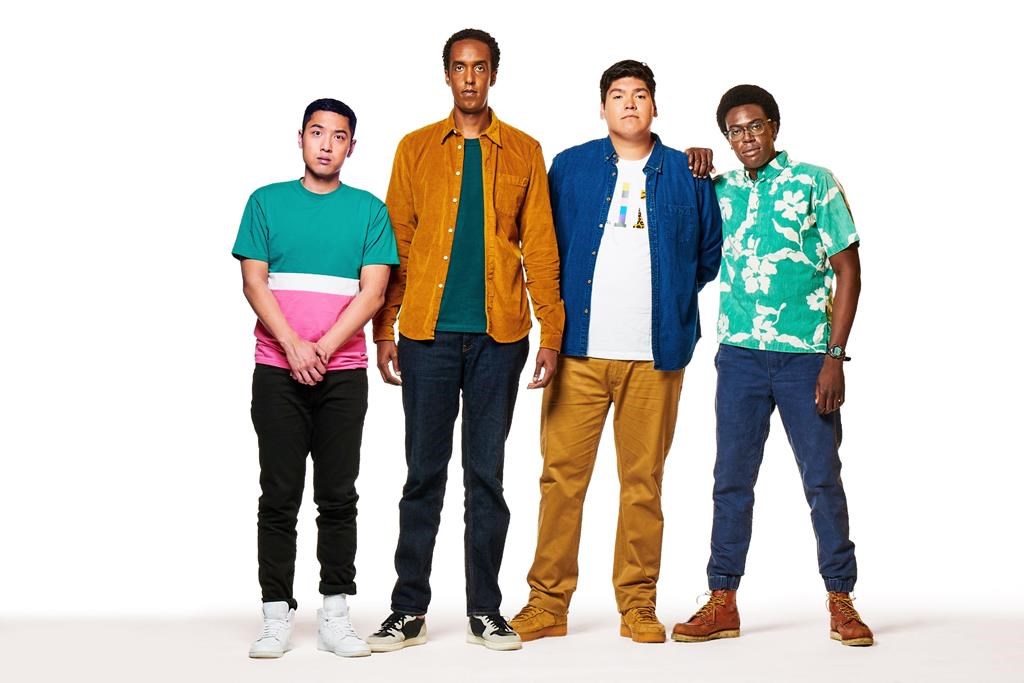TORONTO — Growing up in Somalia, sketch comedy star Guled Abdi rarely saw his culture reflected onscreen.
“Outside of Iman the model, or Barkhad Abdi, who played the Somali pirate in ‘Captain Phillips,’ I can’t name a lot of Somali people I’ve even seen,” Abdi, who moved to Toronto as a refugee in 1991, recalled in a recent phone interview.
“There’s Somali TV but it’s also in Somali, which I’m very terrible at, so I don’t watch it. But on just mainstream TV, I’m not used to seeing Somali people.”
On Tuesday Abdi will help change that when he — along with Vance Banzo, Franco Nguyen, and Tim Blair — debut the new sketch comedy series “Tallboyz” on CBC.
Shot in Toronto and co-executive produced by Bruce McCulloch of “The Kids in the Hall,” the half-hour series sees the members of the troupe Tallboyz II Men presenting sketches that range from absurdist, situational comedy to more hard-hitting material.
The four all have different cultural backgrounds and often incorporate topics surrounding race into the show.
Abdi said a lot of their sketch ideas come from conversations they have as a group about their lives and experiences. If the discussion makes them laugh and they haven’t seen a sketch on it before, they write it down and look for a way to incorporate all of them into the story.
In one sketch, for instance, they’re acting out a public service announcement about racism when they start trying to one-up each other about their hardships and derogatory names they’ve been called over the years.
In another, Banzo is a game-show host in a segment touching on Indigenous-Canadian history.
There’s even a bit alluding to Toronto rapper Drake’s beef with Pusha T. In this case it involves a rapper named Butcha C who writes a diss track about a guy who pointed out his bad grammar on social media.
Other sketches see them playing everything from members of a boy band to “bros” at the gym.
“We always try to be as thoughtful as we can be, especially … talking about race or something socio-political, we always try to have discussions of like, ‘What are the feelings about it?'” said Abdi.
“We’re not trying to shock.”
The troupe came together in 2016 through Toronto’s comedy scene. They got their name from another comedian who suggested Tallboyz due to their height. That evolved to Tallboyz II Men when Abdi’s sister shot a photo of them in which they were all wearing V-neck shirts and inadvertently looked like a boy band.
McCulloch, who sometimes gives guest lectures in Humber College’s comedy program, came on-board after meeting Banzo in one of his classes.
“I remember going, ‘My god, this guy is amazing,'” McCulloch said.
“I was in the writers’ room on a project and I brought him in and he was really funny. Then I found out he had a troupe and I went and saw them and I said, ‘These guys are great. Maybe I should try to do something with them.'”
McCulloch was impressed with not just their comedy but also their camaraderie.
“They have a kindness that just emanates from the stage and when you spend time with them, they’re just really nice to each other, which isn’t something anyone ever said about the Kids in the Hall,” McCulloch said with a laugh.
“There’s something about a real modern sort of bro-ship that they have that is really sweet.”
McCulloch also loved their unique voice.
“They have a formed comedy esthetic that’s really unique and undeniable. They have a lot to say about the modern world in terms of race, which is personal to them and very funny. And then they have a real sense of just silliness, which is their own as well.”
Abdi says he hopes show’s diversity will inspire those who are interested in launching a career in the entertainment industry.
“Sometimes I think, ‘This is going to be wild — a Somali child or even an adult watching me onscreen,'” said Abdi.
“I don’t even know what the impact is but I hope outside of that sphere that it inspires people, even if they don’t want to do comedy, to be like, ‘I want to even be working behind the camera’ or whatever it is they’re pursuing — to just dream bigger and just try something.”
Victoria Ahearn, The Canadian Press







